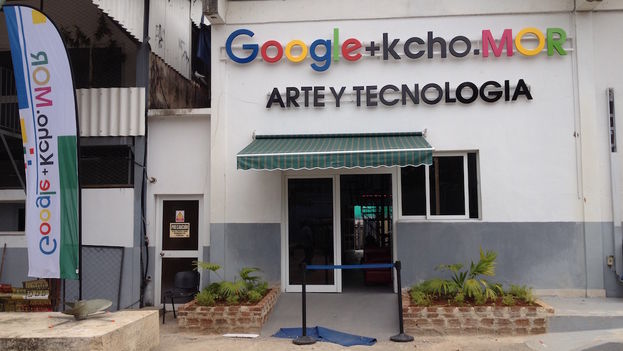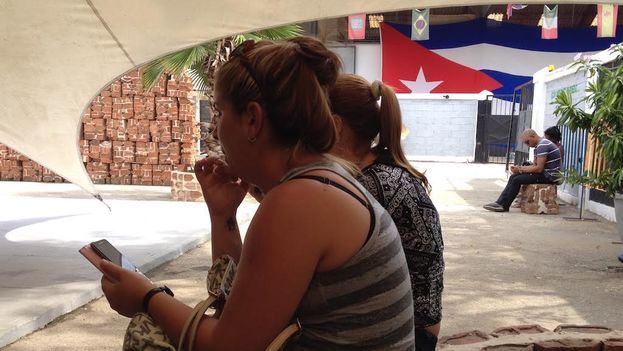
![]() 14ymedio, Luz Escobar, Havana, 31 March 2016 – “Is Google working yet?” the young man asked on Tuesday at the Organic Romerillo Museum (MOR). Outside the cultural center managed by the artist Alexis Leyva, known as Kcho, dozens of people gathered, excited about the launch of web browsing room, However, the place hasn’t opened its doors to the public and the employees respond evasively about the opening date.
14ymedio, Luz Escobar, Havana, 31 March 2016 – “Is Google working yet?” the young man asked on Tuesday at the Organic Romerillo Museum (MOR). Outside the cultural center managed by the artist Alexis Leyva, known as Kcho, dozens of people gathered, excited about the launch of web browsing room, However, the place hasn’t opened its doors to the public and the employees respond evasively about the opening date.
The project, under the name of Google+Kcho.Mor, was announced during the US president’s visit to the island, and has been the subject of several TV reports and articles in the official press. Its services will join a free wireless network through which the artist shares the connection he contracts with the state Telecommunications Company (ETECSA).
MOR is abuzz these days with people coming and going. Some are workers who are putting the final touches on the “technology center,” which the first internaut has not yet been able to access. Closed and surrounded by mystery, the browsing room is the center of rumors and speculation.
“When it’s working there will be priority for students who come through their schools,” explained a worker in response to the insistent questions of several frustrated users. Among them were two teenagers who had crossed the city from Cojimar for “some free internet hours.”
The new location has been described by the press as a site with public computers and a connection speed 70 times faster than that offered in the WiFi zones provided by the state monopoly ETECSA. A luxury in a nation where the broadband penetration rate does not exceed 1%.
With the collaboration of the US software giant Google, Kcho is becoming the first Cuban to reach an agreement of this kind and the only non-state internet provider, which he has achieved because of his ideological fidelity to the government and his strong ties to the authorities.

Evelio, a regular user of the Kcho WiFi zone, complained Tuesday that the new service is still not working. “They already had the opening with great fanfare,” and “even the TV reporters came here that day but as far as I know the only ones allowed in so far are the already scheduled delegations,” he says with annoyance.
The young man, who lives near the studio, explains that he comes “at five in the morning to be able to download movies and videos,” because of the congestion on the network that develops as the day goes on and there is a high influx of users. “At that hour, it works like a cannon,” he says, showing on his phone the titles of movies such as Game of Thrones and House of Cards, that he downloaded the previous morning.
Evelio also lends a hand to those who want to open an email account or look at the US Embassy web page to check on the status of a visa. “If someone wants to give me something for a little help, I accept it,” he lets drop, smiling.
The young man doesn’t have many illusions about the new premises which, according to the official media, will have the appearance of an internet café with 20 Chromebook laptops that work off direct connections to the cloud. A new navigation experience for most Cubans, accustomed to slow connections and using the Windows operating system.
“There is so much need for the internet that this can’t cope,” says Evelio, a few yards from the newly painted ship where Cubans expect that Google’s new Havana heart will soon be beating.
